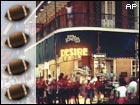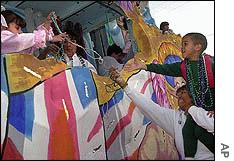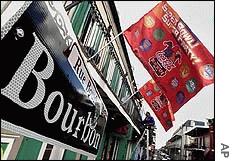|
Economic impact not super
|
 |
January 31, 2002: 9:16 a.m. ET
New Orleans' Mardi Gras limits bump city gets from hosting Super Bowl.
By Staff Writer Chris Isidore
|
NEW YORK (CNN/Money) - Even with travel and tourism still in a slump nationwide in the wake of last year's terrorist attack, New Orleans had most hotel rooms in the city booked this weekend - and that was without the Super Bowl.
The disruption in the NFL schedule due to the attack pushed the game back a week and almost forced the game to be moved out of the Big Easy. The lack of hotel rooms to accommodate the game's estimated 75,000 visitors was one of the biggest problems brought by moving the date of the game, along with an auto dealer's convention that had been booked into the Super Dome for the weekend.
The city was set to celebrate the first weekend of Mardi Gras this weekend with parades and parties, so shifting the date of the game was more complicated than simply getting the convention to swap weekends.
"Actually we would be close to sold out (without the game)," said Sandy Shilstone, the executive vice president of the New Orleans Tourism Marketing Corp., a city agency. "It was quite a challenge when the NFL asked us to switch weeks."

|
|
|
A Mardi Gras parade in New Orleans last weekend. The parade was one of the events rescheduled due to the Super Bowl. | |
In the end, the game stayed put on the new weekend. Mardi Gras parades, the convention and other events were rescheduled for last weekend. But the strong demand for New Orleans' hotel rooms means that the economic impact of the game is somewhat more limited than it would be at other locations.
"If you put a Super Bowl in Detroit in January, it does have a big positive benefit to the city - a significant fraction of those who attend and spend hundreds of bucks a piece wouldn't be there otherwise," said Roger Noll, professor of economics at Stanford University and an expert on the economic impact of sports on a city. "But if you do the same thing in New Orleans for Mardi Gras, you're just displacing people who would be there anyway."
But New Orleans officials insist the city is getting a boost from the big game, even if this would have been a busy weekend without a game. Part of that comes from the value of the publicity that the game brings its tourism industry.
"Our budget is about $5 million a year to advertise tourism nationwide. That's not much," said Shilstone. "The television exposure from having the Super Bowl is significant.
| |

|
|
Worker hangs Super Bowl flags along New Orleans' famous Bourbon Street. | |
"There are 3,000 members of the media here this week. They're looking for interesting stories," Shilstone continued. "Some are writing about New Orleans as a family destination. The Food Network is here right now shooting a week-long series on cuisine. House and Garden television is talking about architecture. A news crew from Japan, while covering the football game, is talking about the birthplace of jazz. This all allows New Orleans to show off all of its attributes."
New Orleans' reputation as a party city during Mardi Gras is allowing it to attract some fans who don't even have tickets to the game.
Randy Samuelson, a Rams fan and St. Louis executive recruiter, is heading to New Orleans with six other friends, only two of whom have tickets to the game. Some, but not all, of them plan to try to buy tickets from scalpers, but they'll be satisfied even if they don't get inside for the game.
"I had to be part of the party," said Samuelson, who is staying at a friend's house in New Orleans. "We'll see what they're asking for tickets, but we may just go right to the bar to get a seat and watch with other Rams fans."
Estimating the economic boost to the city itself from hosting the big game at this time of year is difficult. Tim Ryan, dean of the business school at University of New Orleans says direct spending by fans at the 1990 Super Bowl came to $125 million, and it might be twice as much this time. But he also estimated that the city would have seen $50 to $60 million of tourism spending without the game, meaning there might be close to $200 million in additional spending from a typical Mardi Gras weekend.
The difference could come from hotels raising their rates, coupled with the free spending by those who typically attend the game.
"The people are almost all on expense accounts, corporate business travelers in there wining and dining the customers," Ryan said. "They're paying for their clients' air fare, for hotel rooms. And that leaves a lot of discretionary dollars that can be spent on shopping, food, drinks. Those are not matched by a typical event."
New Orleans' tourism industry is in better shape than many destinations, despite the post-Sept. 11 downturn in travel. Ryan said the city's hotels were about an 83 percent occupancy rate in October, although that was down from a pre-attack estimate of 92 percent. 
|
|
|
|
|
|

|

